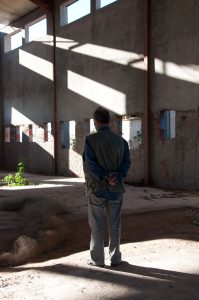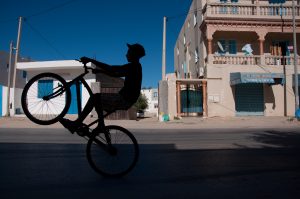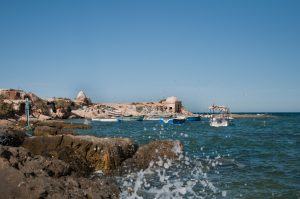 By Morgane Wirtz
By Morgane Wirtz
The turquoise sea bordering Zarzis in the south of Tunisia beckons young people to leave for Europe. In this small town, only old people and children are left.
“Look! From this house, two have gone to France. From that one, three have left. Here lives a doctor, but next door his neighbour is in France. And this is just in this street! In every house, someone has left.” With his arm adorned by a sparkling watch, Aziz* points to the dwellings of the corniche, one by one – splendid, half-empty houses, facing the sea. “Even if they are fine, they leave! Him over there, his son is in France,” he adds, amused. He readjusts his gigantic sunglasses, takes his place behind the wheel of his car and turns on the ignition. The speakers vibrate to the rhythm of Arabic rap and we cross this city in southern Tunisia. Zarzis has the atmosphere of a coastal village in low season. White houses in rows, dazzling under the scorching sun. For the most part, they were built with remittances. Decorated with columns and mouldings, many are still under construction. Building resumes when owners send money from Europe or come home for a vacation.
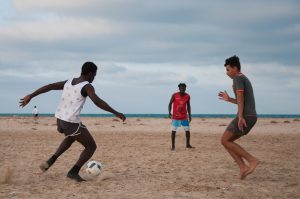 Children dream
Children dream
Old men are seated on cafe terraces. Children pass us on bikes. The great sport is to ride on the rear wheel. They dream of Europe. “I want to go. I don’t like it here. I want to go to my cousin and aunt in France,” explains 13-year-old Mohamed*. “There is nothing you can do here. We suck at everything! But I still want to stay with my mother”, shares an 11-year-old girl. Every year, Tunisian schools lose hundreds of thousands of students. “Last year, I lost dozens of students, who left for Europe,” said Tarsmi Mehrez, a school principal. He explains, “Since the revolution, the cost of living is very high, the price of foodstuff is increasing and the unemployment rate is rising. Libya, which is very close, is distressed… And with corona virus, the price of basic foodstuff has increased even more!“. In the second quarter of 2020, the unemployment rate was around 18%, according to Tunisia’s National Statistics Institute.
An easy crossing
In Zarzis, there is almost no one between the ages of 20 and 40 – well at least no Zarzisians. Here, the representatives of this generation are almost exclusively sub-Saharan migrants. Most of them arrive on foot or by boat from Libya, less than 100 kilometres away. The young Tunisians have almost all set sail for Italy. “It’s easy!”, Aziz says, “from here, Italy is straight ahead. If you go on a quiet night, a night when there is no security, tak, you arrive. Easy! ”
We drive along the white sand beach, lined with palm trees. It smells of algae. The sea air whips our faces. Abandoned huts and hangars are scattered along the shore. This is where aspiring migrants gather before departure. It costs around 4,000 dinars (EUR 1,240) for the crossing. Nowadays, Tunisians are leaving with their whole family and some are joining forces with sub-Saharan migrants to leave together. In July 2020, more than 4,000 Tunisians docked in Italy. But, according to the locals, no major smuggling or human trafficking networks are involved. In Zarzis, it is the fishermen who take people across the sea, or sell their vessels. They do so to make ends meet. Some migrants buy a boat and go to sea together. Others simply steal boats from remote coves.
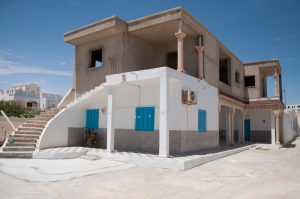 Poor people swallowed up by the sea
Poor people swallowed up by the sea
To avoid coastguard radars, the boats are getting smaller and lighter. “They leave for Europe in groups of 12 to 14 on boats like this one – no bigger than a bathtub!”, Chammsedine Marzoug, activist and founder of the Cemetery of the Unknown, explains. In Medinine, 60 kilometres from Zarzis, graffiti has been drawn in memory of the castaways. Their gigantic faces line up under the caption, “Oh sea! How many poor people have you swallowed up.” Ramzi Chandli is one of the young people missing at sea; he was 19 years old when he left. “He told me: ‘Mum I want to go to France, but I don’t want to buy a lot of clothes, I want money to buy a house’”, says his mother, moved. His cousin explains, “It sounds really simple, but it’s very difficult to buy a house in Tunisia. I am 29 years old and I earn 500 dinars [EUR 155] a month. It’s nothing! I cannot progress. I can’t even get married and build a family. In France it’s much better, it’s euro and you can keep some money and transfer it to dinars”. Accidents happen, but, departing from Tunisia, the crossing is safer than from Libya. “From this city, we have only had one death this July”, says Nourredine Gantri, a local journalist. But Zarzis is known internationally as a beach where the corpses of refugees and migrants who have left Libya wash up.
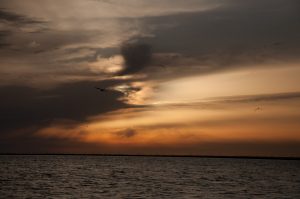 In the name of freedom
In the name of freedom
As the sun sets, Aziz cuts off the ignition and stops on a strip of sand surrounded by water. The view is amazing. “Even if you’re rich, if you don’t have French papers, a woman will not marry you”, he says, “But in France there are some who have papers and who can’t find work! They struggle. But women think that everything is fine there”. Aziz spent a year in France and then decided to come home. Without papers, it was complicated and, because of the theft and small crimes committed by some Tunisians, he believes the goodwill of the French people towards them has evaporated.
Aziz pulls on his cigarette, admiring the hues in the sky. He stretches. He is rich, his country is beautiful, so why does he want a Schengen passport? “For tranquillity”, he says, “So that I can build a coffee shop in Italy – or Miami. Do you see what I mean? When you have the right papers, you are free. For me, freedom is good!”.
* The names of some of the people in this article have been changed to preserve their anonymity.
Morgane Wirtz
Journalist, Researcher and PhD student with Tilburg University
Thank you to ZonMw for funding the research project
